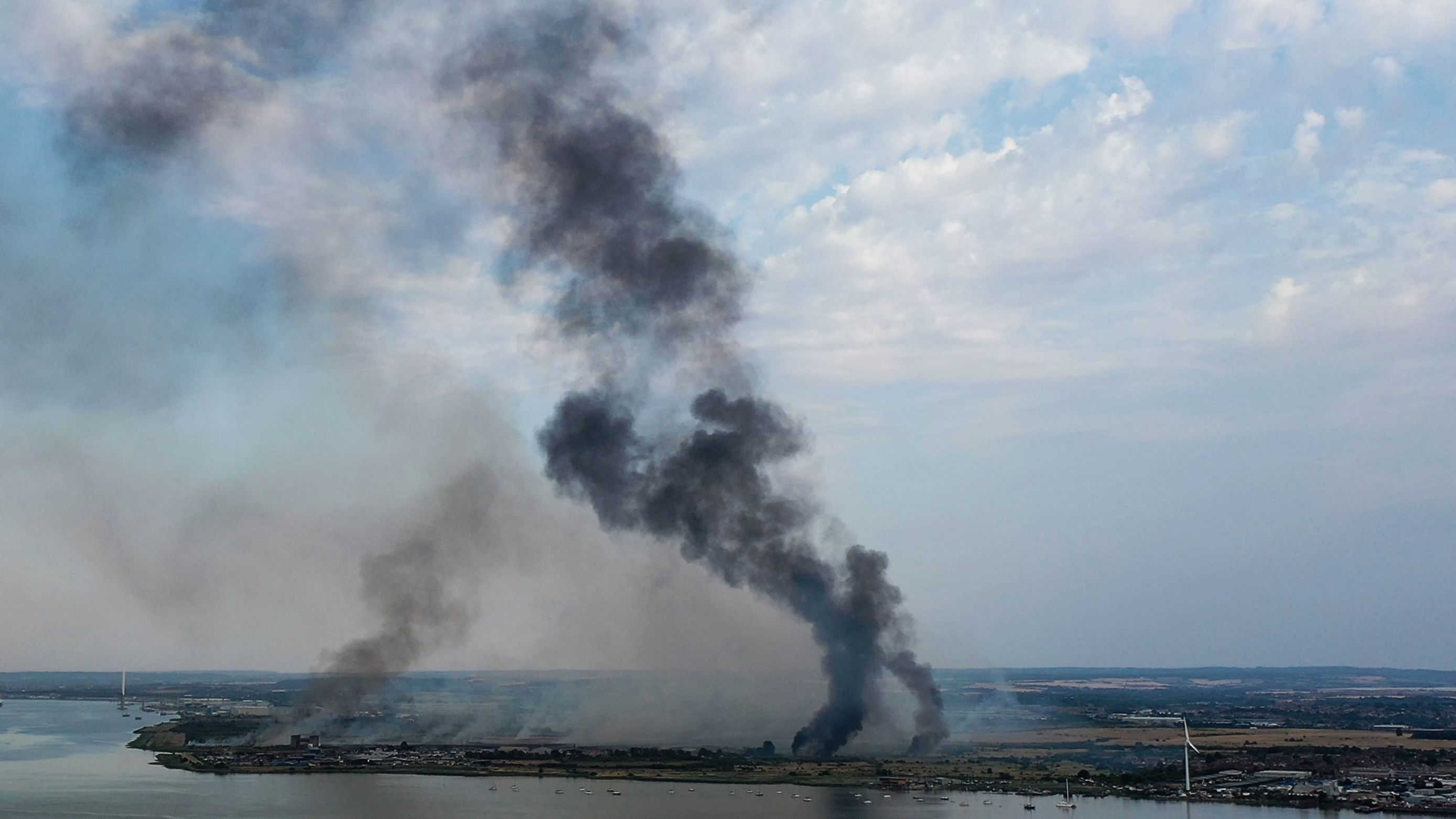Blistering British heatwave made at least 10 times more likely by climate change
Sign up now: Get ST's newsletters delivered to your inbox

Smoke rises from fires in Dartford, Kent, on July 19, 2022.
PHOTO: REUTERS
Follow topic:
SINGAPORE - The record heatwave that baked Britain earlier this month, triggering dozens of fires and disrupting travel, was made at least 10 times more likely because of climate change, an analysis by an international group of scientists released on Friday (July 29) has found.
The study by the World Weather Attribution (WWA) initiative examined the July 18-19 heatwave that broke temperature records across parts of Britain. It found that without the influence of greenhouse gas emissions, the event would have been far more unlikely and temperatures 4 deg C cooler.
During the heatwave, temperatures hit 40.3 deg C in Coningsby in Lincolnshire, breaking the previous maximum national temperature record of 38.7 deg C set in 2019. Local records were broken in 46 weather monitoring stations across the country.
More than 840 people may have died in England and Wales, according to a preliminary analysis cited by the researchers. The final death toll will not be known for weeks, but it is likely to be high in a country unaccustomed to such heat extremes. The World Health Organisation's European office said on July 22 that the heatwave baking Europe had caused over 1,700 deaths on the Iberian Peninsula alone.
Climate change is driving up temperatures across the globe, triggering more intense heatwaves and wildfires.
WWA, which involves scientists around the globe, uses weather records, statistical methods and complex computer models to determine how much climate change has influenced a particular weather event. For heatwaves, the pattern is clear, WWA says. All heatwaves are linked to climate change.
"Heatwaves are one of the most obvious, most dangerous and biggest impacts of climate change," Dr Friederike Otto, senior lecturer in climate science at Imperial College London and co-leader of WWA, told a media briefing on Thursday.
Since pre-industrial times, the world has warmed on average 1.2 deg C and - based on current greenhouse gas emissions - is on track to reach 1.5 deg C within a decade or so. Breaching this level will trigger far more severe climate impacts, scientists say.
Referring to Britain's heatwave, Dr Otto said: “It’s also important to stress that while it’s still rare in a 1.2 deg C world, we don’t live in a stationary 1.2 deg C world. We are living in a world where temperatures are rising very, very fast. And so in a 1.3 or 1.4 deg C world, this type of event will already be much less rare.”
WWA has found strong links between climate change and other record heatwaves.
The June 2021 heatwave in the north-west United States and parts of western Canada would have been "virtually impossible" without climate change, the initiative found. The March to May heatwave in India and Pakistan was 30 times more likely because of greenhouse gas pollution. And the Siberian heatwave in the first half of 2020 was 600 times more likely.
To quantify the effect of climate change on temperatures in Britain, scientists analysed current and historical weather data and computer simulations to compare the climate as it is today, after about 1.2 deg C of global warming since the late 1800s, with the climate of the past.
The analysis focused on the maximum temperatures over two days around central England and east Wales, the most affected area. They found the likelihood of such an event in a 1.2 deg C cooler world was extremely low.
Using observational data and statistical methods, they tried to answer the question: If the heatwave occurred in a 1.2 deg C cooler world, what would the temperature be?
"We found that this heatwave would have been 4 deg C cooler," said Dr Otto.
The intensity of Britain's heatwave surprised researchers.
"Two years ago, scientists at the UK Met Office found the chance of seeing 40 deg C in the UK was now one in 100 in any given year, up from one in 1,000 in the natural climate. It's been sobering to see such an event happen so soon after that study," Dr Fraser Lott, of the UK Met Office Hadley Centre and study co-author, said in a statement.

